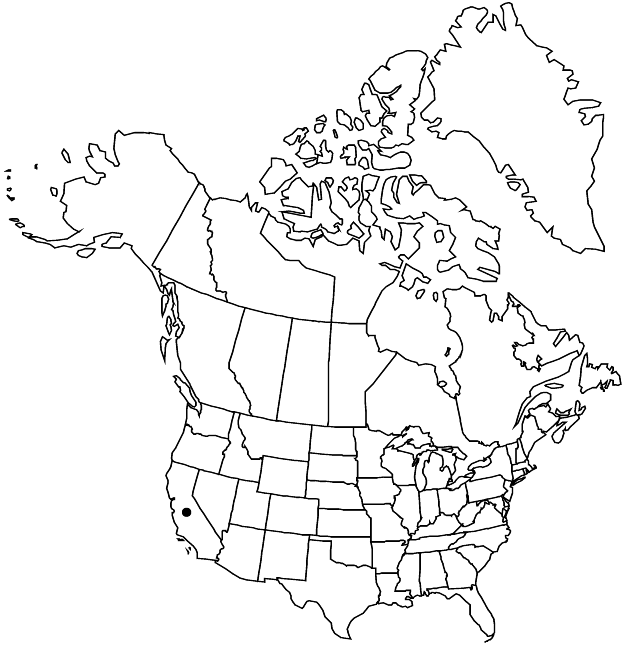Difference between revisions of "Arctostaphylos crustacea subsp. crustacea"
FNA>Volume Importer |
FNA>Volume Importer |
||
| Line 25: | Line 25: | ||
|elevation=100-1100 m | |elevation=100-1100 m | ||
|distribution=Calif. | |distribution=Calif. | ||
| − | |discussion=<p>Subspecies crustacea occurs in the southern portion of the North Coast Range around the eastern San Francisco Bay uplands, Santa Cruz Mountains, northern Diablo Range, and Gabilan Mountains to Monterey Bay, and from there disjunct to the San Luis Obispo coast and Santa <i>Rosa</i> Island. In mainland populations, occasional glandular-hairy individuals may be found, suggesting introgression with other species such as <i>Arctostaphylos glandulosa</i>. These individuals would key to <i></i>subsp.<i> subcordata</i>, an island endemic.</p><!-- | + | |discussion=<p>Subspecies crustacea occurs in the southern portion of the North Coast Range around the eastern San Francisco Bay uplands, Santa Cruz Mountains, northern Diablo Range, and Gabilan Mountains to Monterey Bay, and from there disjunct to the San Luis Obispo coast and Santa <i>Rosa</i> Island. In mainland populations, occasional glandular-hairy individuals may be found, suggesting introgression with other species such as <i>Arctostaphylos glandulosa</i>. These individuals would key to <i></i></i>subsp.<i><i> subcordata</i>, an island endemic.</p><!-- |
--><p><i>Arctostaphylos</i> ×campbelliae has been considered <i>A. crustacea </i>subsp.<i> crustacea</i> and is similar in most respects except for its slightly glaucous-green leaves with stomata present on the adaxial surface (although fewer than on abaxial surface).</p> | --><p><i>Arctostaphylos</i> ×campbelliae has been considered <i>A. crustacea </i>subsp.<i> crustacea</i> and is similar in most respects except for its slightly glaucous-green leaves with stomata present on the adaxial surface (although fewer than on abaxial surface).</p> | ||
|tables= | |tables= | ||
| Line 50: | Line 50: | ||
|publication year= | |publication year= | ||
|special status= | |special status= | ||
| − | |source xml=https://jpend@bitbucket.org/aafc-mbb/fna-data-curation.git/src/ | + | |source xml=https://jpend@bitbucket.org/aafc-mbb/fna-data-curation.git/src/f6b125a955440c0872999024f038d74684f65921/coarse_grained_fna_xml/V8/V8_863.xml |
|subfamily=Ericaceae subfam. Arbutoideae | |subfamily=Ericaceae subfam. Arbutoideae | ||
|genus=Arctostaphylos | |genus=Arctostaphylos | ||
Revision as of 20:30, 24 September 2019
Twigs short-hairy and with longer, white hairs, sometimes glandular. Leaf blade surfaces ± glabrous or sparsely short-hairy abaxially. Immature inflorescence axes glabrous or hairy, sometimes glandular (not densely glandular-hairy). Ovaries densely hairy. 2n = 52.
Phenology: Flowering winter–early spring.
Habitat: Maritime and marginal interior chaparral and closed-cone conifer forests
Elevation: 100-1100 m
Discussion
Subspecies crustacea occurs in the southern portion of the North Coast Range around the eastern San Francisco Bay uplands, Santa Cruz Mountains, northern Diablo Range, and Gabilan Mountains to Monterey Bay, and from there disjunct to the San Luis Obispo coast and Santa Rosa Island. In mainland populations, occasional glandular-hairy individuals may be found, suggesting introgression with other species such as Arctostaphylos glandulosa. These individuals would key to subsp. subcordata, an island endemic.
Arctostaphylos ×campbelliae has been considered A. crustacea subsp. crustacea and is similar in most respects except for its slightly glaucous-green leaves with stomata present on the adaxial surface (although fewer than on abaxial surface).
Selected References
None.
